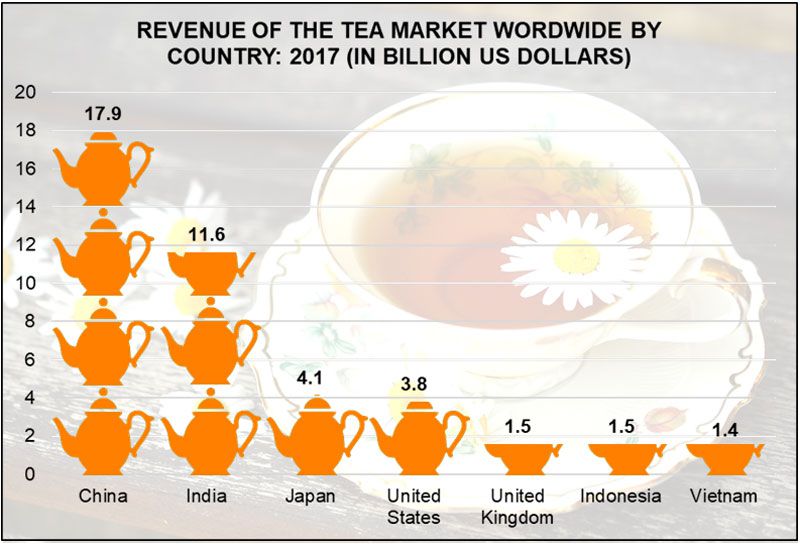
Top stories


Marketing & MediaWarner Bros. was “nice to have” but not at any price, says Netflix
Karabo Ledwaba 21 hours



Logistics & TransportMaersk reroutes sailings around Africa amid Red Sea constraints
Louise Rasmussen 14 hours

More news

















Consumers are, however, becoming more discerning about their choice of tea. They are moving towards healthier options and choosing to consume less, but better-quality teas. Over the last year the South African tea industry has shown a decline in terms of sales volume, but an increase in value. The increase in value was primarily driven by the growth of rooibos, green and other fruity herbal teas.
Insight Survey’s latest SA Tea Industry Landscape Report 2018 discusses the global and local tea markets based on the latest information and research. It examines the market drivers and challenges, as well as global and local market trends to present an objective insight into the environment, market dynamics, and future of the South African tea industry.
At a global level, the tea and RTD tea markets are experiencing growth. The global tea industry reached a total of US$25.5 billion in 2017 with a growth rate of 5% predicted until 2025. The largest market for both tea and ready-to-drink (RTD) tea was China, reaching total market sizes of US$17.9 billion and US$14.4 billion in 2017, respectively.

The total value of the South African tea market had increased significantly, with a compound annual growth rate of 12.1%, between 2012 and 2017. The strongest value (and volume) growth was achieved by rooibos, green tea and fruit/herbal tea, rather than the relatively modest value growth of 7% for black tea. However, the total tea market volume had actually declined by more than 10% over the same period, almost exclusively due to the decline in black tea volume.
Rooibos, however, continues to excite consumers and increase in popularity in different parts of the world. Starbucks UK, for example, recently introduced two new variants of rooibos lattes to 950 of their stores in the UK. According to Adele du Toit, spokesperson for the SA Rooibos Council, there is a lot of innovation happening in terms of the rooibos tea category and different mixes and product offerings are being developed. She also suggests that for the millennial consumer, the standard cup of tea is not enough. The younger generation is demanding higher-quality tea and lots of options and flavours.
Although the demand for better quality teas and the healthy living trend will likely continue to grow demand for tea products, poor local economic performance and associated lowered consumer spending, will continue to be a challenge for the local tea industries as consumers seek to cut down on what they perceive as ‘luxury’ items. Furthermore, lowered local production of tea is likely to continue to put pressure on tea prices, while the South African sugar tax implemented in 2018 may negatively impact the local RTD tea industry as well, forcing local players to innovate in terms of product content and variety to mitigate the impact of the tax.
In order to effectively operate within the South African market, it is essential for local tea and RTD tea players to obtain insights and perspectives regarding the local industry that will provide a competitive edge.
The South African Tea Industry Landscape Report 2018 (118 pages) provides a dynamic synthesis of industry research, examining the tea market from a uniquely holistic perspective, with detailed insights into the entire value chain – from production through to consumption.
Some key questions the report will help you to answer:
Please note that the 118-page report is available for purchase for R25,000 (excluding VAT). Alternatively, individual sections can be purchased for R9,000 (excluding VAT). For additional information simply contact us at az.oc.yevrusthgisni@ofni or directly on (010) 140-5756 or (021) 045-0202.
For a full brochure please go to: South African Tea Industry Landscape Report 2018.
About Insight Survey:
Insight Survey is a South African B2B market research company with more than 10 years of heritage, focusing on business-to-business (B2B) market research to ensure smarter, more-profitable business decisions are made with reduced investment risk.
We offer B2B market research solutions to help you to successfully improve or expand your business, enter new markets, launch new products or better understand your internal or external environment.
Our bespoke Competitive Business Intelligence Research can help give you the edge in a global marketplace, empowering your business to overcome industry challenges quickly and effectively, and enabling you to realise your potential and achieve your vision.
From strategic overviews of your business’s competitive environment through to specific competitor profiles, our customised Competitive Intelligence Research is designed to meet your unique needs.
For more information, go to www.insightsurvey.co.za.